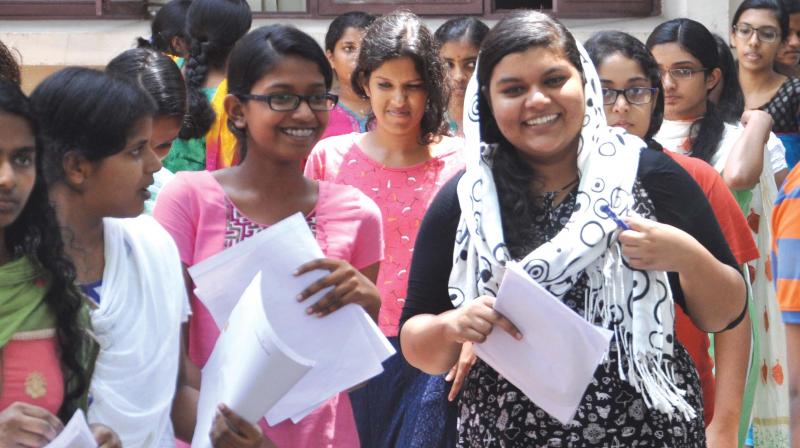The hidden costs
The government must intervene and make it affordable for the meritorious, irrespective of their financial status.

The steep hike in fee for post-graduate courses in private management medical colleges will result in a high-cost health care delivery system in the state. The government must intervene and make it affordable for the meritorious, irrespective of their financial status.
NEET, the much needed unified exam for entry into medical colleges, is expected to make the admission system transparent. Only if the government respected its spirit.
But that does not seem to be happening in Kerala, a land which has enviable records in the field of health care and medical education. Instead, its opposite is becoming the reality; that is medical education is increasingly become inaccessible to most sections of people as most number seats are in the private sector which charge fee most people cannot afford. (As many as 2850 of the total 4050 MBBS seats and 504 of the 1411 PG/super speciality PG seats are in the private sector. From the looks of it, the ratio will continue to tilt in favour of the private sector.)
The most glaring problem as we see it is the high fee for post-graduate (residency) programmes such as MS, MD, MCh and DM. The fees have been hiked, in clinical specialties, from Rs 6.5 lakh to Rs 14 lakh a year for programmes in private medical colleges. In non-clinical specialities the fee for merit seats has been hiked to Rs 8.5 lakh from Rs 2.6 lakh and for clinical diploma courses, it has been increased to Rs 10.5 lakh from Rs 4.9 lakh. And the fee for management sets is lowered to Rs 14 lakh from Rs 17 lakh while unifying the fee structure.
Some colleges argue that they do not have the money to pay the students the mandatory stipend. But the fact is that the residents are the major works force in medical colleges, and the stipend given to them is comparatively low. They do the bulk of the routine clinical work including manning emergencies and ICUs round the clock. As per the rules, a resident doctor has to function as the junior most staff member in their respective departments to provide teaching and training and services to the patients. They are the first level managers of specialty departments. A resident has to carry out emergency duties, continuous patient care, on-call duties, and duties as junior consultant to other departments and conduct teaching programmes to undergraduate medical, nursing and paramedical staff. Major institutions like AIIMS pay them around Rs 75,000 per month.
The PG stipend in Kerala is Rs 42,000-44,000 as per government order. Many of the private medical colleges pay as less as Rs 5,000 (Christian managements, MES, Gokulam and AIMS are exceptions)
Now the key question: do we require that medical education be affordable to almost all people in our society?
The answer, we believe, is yes.
Education is the legitimate means for people to move up the ladder of success. The poor and the middle class see it as the only way to advance. Many risk all their life's earnings into the education of their children. Taking it away would not only breed extreme discontent, but also would be morally wrong. Very wrong.
Educational loans are not the solution. In the US, a medical student can pay back the loan in 10 to 15 years. In India, the realistic salary projections make it clear that this is not possible. (The starting salary for a specialist in the health service is Rs 51,600 per month and that in government medical college is around Rs 80,000 per month).
And that is not all. The system relies more on the conscience of the doctor than on inherent checks and balances. And conscience is easily corrupted. Desperate need for money makes most consciences as vulnerable as a software system exposed to the internet without anti-virus, and we cannot afford that. We need to generate a body of professionals, however small it may be, who are altruistic enough to work in difficult areas, where the needs are high.
How do we solve this contradiction?
We cannot scrap privatisation as 80 per cent of our health care needs are right now met by private players. But the government can do one thing: make sure that at least 50 per cent of the seats in all private institutions of higher learning are given to deserving students based on NEET or similar common exams. The government can give scholarships and make these seats completely free. Oar the government can force private managements to give them scholarships. There can be a cut-off for admission, like say 25 percentile score in NEET.
Some colleges will go bust. Let them. Only the best ones will remain. If there are legal hurdles for these measures, let there be real effort, including introduction of new laws by Parliament to overcome these.
Whatever the way in which the selection process is solved, there should be a tough, legitimate examination system to ensure that only those who are fit to practice graduate as doctors.
It is extremely important to make all residencies into on-the-job training posts where the trainees are paid for their work. These are not, and should not be post-graduate courses. Let us realise that nowhere else in the world are residency programmes treated as courses for which the candidates pay fees. They may pay exam and tuition fees, but this will be less than the salary they receive as on-the-job doctors getting trained. We need changes, and the time is - NOW.
(Dr. Jimmy Mathew and Dr Jinesh P.S. are members of Info Clinic India, an organisation involved in health Education and social aspects of modern medicine. Dr. Mathew works in a private medical college and Dr. Jinesh in the government sector. Views are personal)

